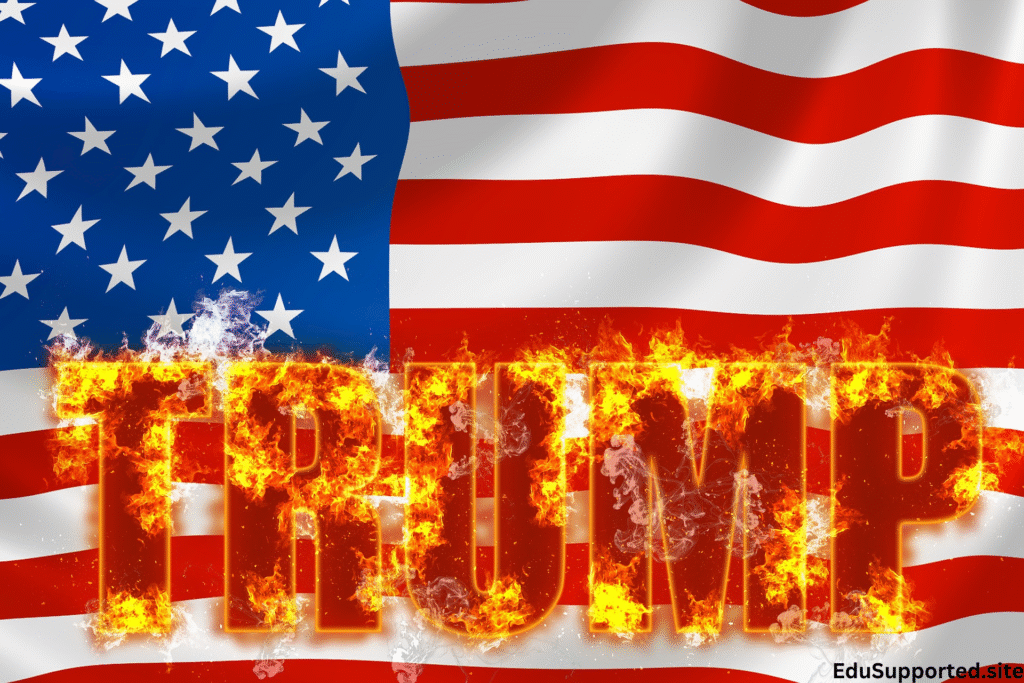Introduction
“Trump transfers student loans to SBA.” is a hot subject in the dynamic realm of student loan reform. In 2025, when former president Donald Trump makes a big return to politics, discussions concerning federal student loan debt, forgiveness, and new management approaches are again in the headlines.
But what exactly does it mean to transfer student debts to the SBA? Does this claim hold water or not? Concerning the 43 million Americans who have outstanding balances on their federal student loans, what would it imply?
With the phrase “Trump transfers student loans to SBA.” in mind, this article will analyse the claim, clear up any confusion, and think about the consequences of this policy shift.
Appreciating the SBA’s Contribution
The Small Business Administration (SBA) is an agency of the United States government that helps small businesses via contracts, coaching, and loans. Student debt management and education finance have not traditionally been its areas of focus. However, in order for the SBA to take over student loans, it would have to completely revamp its loan processing and repayment procedures.
The SBA’s administration of the Pay check Protection Program (PPP) during the COVID-19 pandemic was well acclaimed. Consequently, a number of political scientists have advocated for the modification of the SBA’s infrastructure to support other lending services, including student loans. That kind of action, however, has never been done before.
Was Trump Really Considering Transferring Student Loans to the Small Business Administration?
By the middle of 2025, Donald Trump still hasn’t officially proposed turning student loans over to the Small Business Administration. It seems that the claim that “Trump transfers student loans to SBA” is either not founded on reality or is speculative derived from political discussions around government reform and loan forgiveness.
However, Trump’s past and current positions on student debt reform provide important context:
-
The student loan policies proposed by Trump for the years 2017–2021/2021/202 would cap repayment at 12.5% of discretionary income.
-
Proposed a future end to PSLF (Public Service Loan Forgiveness) for borrowers.
-
Recommended cutting down federal aid for student loans.
-
The Department of Education (DoE) should be the primary agency responsible for overseeing loan repayment programs, not the Small Business Administration (SBA).
At this time, no reliable source has confirmed that Trump has transferred or intends to transfer federal student loans to the SBA.
Why Is This Keyword So Well-Rounded?
The expression “Trump transfers student loans to SBA” has likely gained popularity because to a combination of optimistic thinking, misinformation, and speculation on social media. A growing number of individuals are being enticed by unrealistically ambitious reform plans in response to rising student loan interest, repayment problems, and promises of forgiveness from politicians such as Joe Biden.
Additionally, SEO dynamics are associated with the phrase’s popularity. Many individuals keep checking for news on student debt forgiveness in the expectation that things will get better soon. Trump and the SBA are important to government assistance, thus mentioning them in these kinds of queries improves traffic.
Could the Small Business Administration Handle Student Loans?
Even if it is still very hypothetical, the pros and downsides of shifting student loan management from the Department of Education to the Small Business management should be taken into account.
Potential Advantages
-
Streamlined Loan Processing: The SBA is well-versed in forbearance policies and may expedite payouts (as shown by PPP). A faster processing time for loan applications and discharges can be the outcome of this.
-
Entrepreneurial Incentives: Scholars with substantial debt often delay the establishment of their businesses. A Small Business Administration (SBA) loan program that links student debt reduction to starting a business could encourage more people to go into business for themselves.
-
Programs for Forgiveness: If things were to change, new forgiveness programs may be launched with the express purpose of bolstering small business-driven economic growth.
Possible Negative Effects
-
Student loan debt is not the SBA’s principal mission; rather, it is to aid small businesses. The organisation may not be able to manage such a sudden shift.
-
Existing repayment arrangements and forgiveness efforts may be disrupted, and borrowers, lenders, and financial aid organisations may all get confused as a result of the shift.
-
Loss of protections: The safeguards afforded to borrowers by the Higher Education Act might be rendered ineffective if regulatory frameworks undergo changes and oversight is transferred.
Differences in Approach to Student Loans: Trump vs. Biden
Although Trump has not proposed a transfer to the SBA, President Joe Biden’s administration has accomplished much in the area of student loan reform:
-
Launched a new income-driven repayment plan called the SAVE Plan, which offers a better likelihood of loan forgiveness.
-
Authorised the cancellation of over $160 billion in loans to individuals who had been deceived by financial firms, including those with disabilities and public servants.
-
The COVID-19 forbearance period was prolonged, but in October 2023, payments resumed.
In contrast, Trump’s approach prioritises individual responsibility over broad pardons, program streamlining, and reforms that do not increase the national debt.
Until Trump seeks reelection or policy power in 2025, speculations surrounding the Student Loan Administration (SBA) and other aspects of the student loan system will continue.
SEO Insights: Ranking for the Keyword “Trump Transfers Student Loans to SBA”
From an SEO perspective, the phrase “Trump transfers student loans to SBA” is not very credible, but it is really interesting. Because of this, it is good at directing traffic, but it may be harmful if used incorrectly or presented incorrectly.
To get a high keyword ranking:
-
Use the exact phrase naturally in headlines and content.
-
Clarify the current status of the claim without delay.
-
Please provide updates and reputable sources.
-
Include related long-tail keywords in your discussion, like:
-
“Forgiveness of Trump student loans by 2025”
-
“Student loan program offered by SBA”
-
“SBA for Trump’s education reform”
-
“Student loans: Trump vs. Biden 2025”
-
Basic Enquiries and Responses (FAQ)
1. Is the SBA receiving student loan transfers from Trump?
No. Trump has not officially shifted student loan debt to the SBA via law or policy as of 2025.
2. Why did Trump allegedly give the Student Loan Guarantee Program to the Small Business Administration?
The SBA’s prominence during COVID-19 debt relief attempts, internet speculation, or misunderstandings over his past policies are likely to blame.
3. Can the Small Business Administration legally regulate student loans?
At this moment, no. Legal authority for the Department of Education’s work comes from the Higher Education Act. Major infrastructure upgrades and Congressional clearance would be required for any change.
4. What are Trump’s current plans on student loans?
Despite the lack of an official SBA plan, Trump has shown his support for simplified repayment and has even hinted at the possibility of ending certain forgiveness programs.
5. Shall the SBA ever deal with student loans?
It seems quite unlikely given the current state of law and practice. When it comes to allocating funds, the SBA still puts small companies ahead of education.
To Sum Up
“Trump transfers student loans to SBA” conjures up images of political unrest, misinformation, and intrigue. Even while there has been no official action to transfer student loan oversight to the SBA, the notion reflects a broader dissatisfaction with the current system and a want for reform.
Borrowers should stay informed via official government sources rather than relying on hearsay or speculation. Regardless of who is in charge of student loan reform—the Department of Education or another entity—the issue will remain a major political and economic problem well into the future, beyond 2025.
